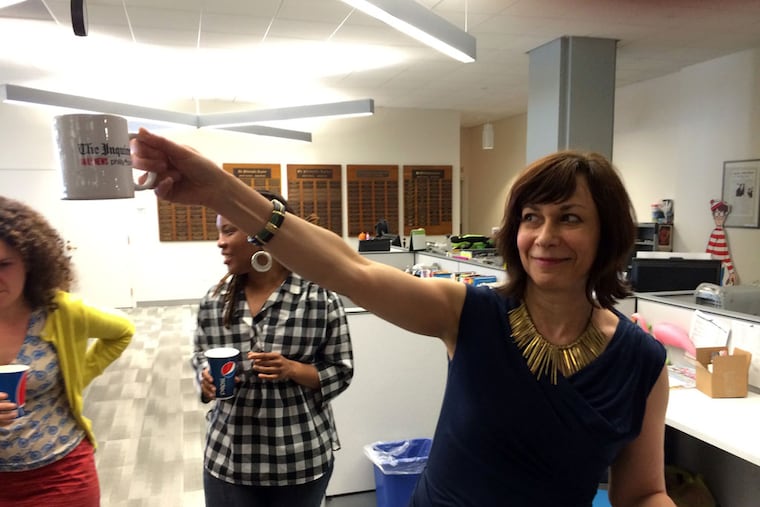Inquirer's Saffron, critic of the built environment, wins Pulitzer
Inga Saffron grew up in Levittown, N.Y., the model of modern, mass-produced suburban communities. But as a journalist, she developed a passion for cities.

Inga Saffron grew up in Levittown, N.Y., the model of modern, mass-produced suburban communities. But as a journalist, she developed a passion for cities.
As a foreign correspondent, she recalled witnessing the devastating shelling of the "beautiful, ancient" metropolis of Sarajevo in 1992 that started the war in Bosnia.
But, she observed, cities also could be ruined by bad decisions made by leaders. Saffron, now architecture critic for The Inquirer, "wanted to write about cities being rebuilt," she said.
Three times, she was named a finalist for the Pulitzer Prize in criticism. On Monday, she was honored with journalism's most prestigious award.
The Pulitzer committee wrote that Saffron's writing "blends expertise, civic passion, and sheer readability into arguments that consistently stimulate and surprise."
The announcement was a surprise to Saffron, who was about to leave the office to cook a Passover seder for 10 people at her Philadelphia home.
"It doesn't feel real," she said as she sipped champagne from a paper cup, which was upgraded to a coffee mug and finally a short glass tumbler.
"To all of us, you really exemplify the best there is in journalism: great reporting, great writing, incisive criticism," editor William K. Marimow told Saffron as a jubilant newsroom staff looked on.
"And coming at a time like this, when the newsroom has been in tumult, it's just a great day for you and for The Inquirer. Make sure to savor it," he said.
Marimow was referring to the ongoing legal battle among owners of the newspaper's parent company, Interstate General Media, over how to dissolve their partnership. As The Inquirer's newsroom celebrated the Pulitzer on Monday, the first day of hearings on how the newspaper and IGM are to be sold at auction began in Delaware Chancery Court.
Stan Wischnowski, executive editor, recalled past frustrations that accompanied the times when Pulitzer judges recognized Saffron with runner-up status.
"This time, those judges finally woke up to the fact that this paper is blessed with the best architecture critic in the world," Wischnowski said.
He later added: "To be considered for journalism's top award so consistently is a real testament to her expertise and command of the subject."
Saffron's "Changing Skyline" column has been a feature in The Inquirer since 1999. Pushing beyond the usual boundaries of architectural criticism, her columns focus on the buildings and public spaces that Philadelphians encounter in their daily lives.
She applies a reporter's skills and sensibility to explore the variety of forces - political, financial, cultural - that shape the city. Her columns on waterfront development, zoning, and parking issues have led to significant changes in city policy.
Among Saffron's writings considered by the Pulitzer judges was this gastro-meets-architecture review last year on a new Cheesecake Factory restaurant in Center City:
"I'll admit that when I first heard that the popular suburban temple of caloric overload was touching down at 15th and Walnut Streets, the news didn't exactly stoke my appetite for good design. I imagined a generic box, done up in flat, lifeless stucco the color of American cheese, elbowing its way onto a corner that has been occupied for the better part of a century by three ordinary, but charming, commercial buildings. But the architecture gods have smiled on Philadelphia."
Monday afternoon, Saffron, who started at The Inquirer in 1984 as a reporter in Burlington County, was the one smiling.
"It's been such an incredible privilege to do this, and I hope to do it for many more years," she said, pausing for a second, then adding, to cheers from her colleagues, "here, at The Inquirer."
Besides covering the war in the former Yugoslavia, Saffron served as the paper's Moscow correspondent from 1994 to 1998. During that assignment, she reported on the destruction of Grozny during the first Chechen war.
After returning from Moscow, Saffron wrote a book about the cultural history of caviar and the environmental impact of commercial caviar production.
In 2012, she completed a Loeb Fellowship at Harvard University's Graduate School of Design.
Saffron's Pulitzer, which comes with $10,000, is the 20th for The Inquirer, which won the 2012 Public Service award for a series on violence in Philadelphia public schools.
This year, Guardian US (the American online operation of the London newspaper) and the Washington Post each were awarded the prize for public service for their coverage of surveillance by the National Security Agency, and the Reuters news agency won for international reporting for its stories on the violent persecution of a Muslim minority in Myanmar.
The Boston Globe won for breaking news coverage of the Boston Marathon bombing and manhunt.
The local news reporting award went to the Tampa Bay Times team of Will Hobson, a former Inquirer correspondent and graduate of Malvern Preparatory School, and Michael LaForgia for what the committee said was their "relentless investigation into the squalid conditions that marked housing for the city's substantial homeless population, leading to swift reforms."
Inquirer staff writer Joseph A. Gambardello contributed to this article.